- Home
- Richard Dawkins
An Appetite for Wonder Page 3
An Appetite for Wonder Read online
Page 3
Nowadays, such long-term separation of children from their parents is regarded with something approaching horror, but it was quite common at the time, accepted as an inevitable concomitant of empire, and indeed diplomatic service, when international travel was long, slow and expensive. Child psychologists might suspect that it did lasting damage. Both John and Bill, as it happened, ended up well-adjusted, very personable characters, but there may have been others less robustly equipped to come through such childhood deprivation. Their cousin Yorick, as I have already mentioned, was eccentric and possibly unhappy; but then, he went to Harrow, which – to say nothing of the pressures of association with Wittgenstein – might explain everything.
During one of these school holidays with the grandparents, old Arthur Smythies offered a prize to whichever of his grandchildren could make the best collection of wildflowers. John won, and that boyhood collection became the nucleus of his own herbarium, setting him on the road to becoming a professional botanist. As I have said, a love of wildflowers was one of the things he later found in common with Jean, my mother. They also shared a love of remote and wild places, and a dislike of noisy company: they were not fond of parties, unlike John’s brother Bill and Jean’s sister Diana (who later married each other).
At the age of thirteen, John and then Bill left Chafyn Grove and were sent to Marlborough College in Wiltshire, one of England’s better-known ‘public’ (i.e. private) schools, originally founded for the sons of clergymen. The regime was spartan; cruel, according to John Betjeman in his verse autobiography. John and Bill don’t seem to have suffered in the way the poet did – indeed, they enjoyed it – but it may be revealing that, when Colyear’s turn came some six years later, their parents decided to send him to a gentler school, Gresham’s, in Norfolk. For all I know, Gresham’s might have suited John better too, except that Marlborough had a legendary teacher of biology, A. G. (‘Tubby’) Lowndes, who probably inspired him. Lowndes has a number of famous pupils to his credit, including the great zoologists J.Z. Young and P. B. Medawar and at least seven Fellows of the Royal Society. Medawar was an exact contemporary of my father, and they went on to Oxford together, Medawar to read zoology at Magdalen and my father to read botany at Balliol. I have reproduced, in the web appendix, a historical vignette which is a transcript of a monologue by Lowndes, recorded verbatim by my father and almost certainly heard by Medawar in the same Marlborough classroom. I think it is of interest as a kind of anticipation of the central idea of the ‘selfish gene’, although it didn’t influence me as I didn’t discover it in my father’s notebook until long after The Selfish Gene was published.
After his degree at Oxford, my father stayed on to do a postgraduate research degree – the one on tussocks that I mentioned earlier. He then decided on a career in the agriculture department of the Colonial Service. This necessitated further training in tropical agriculture at Cambridge (where his landlady had the memorable name of Mrs Sparrowhawk) and then – after becoming engaged to Jean – at the Imperial College of Tropical Agriculture (ICTA) in Trinidad. In 1939 he was posted to Nyasaland (now Malawi) as a junior Agricultural Officer.
CAMP FOLLOWERS IN KENYA
JOHN’S posting to Africa hastened my parents’ plans, and they were married on 27 September 1939 in Little Baddow church. John then left by ship for Cape Town, whence he travelled on to Nyasaland by train, and Jean followed in May 1940 in the flying boat Cassiopeia. Her rather dramatic journey took a week, with numerous landings for refuelling; one of them was in Rome, which caused some anxiety as Mussolini was teetering on the brink of entering the war on the German side, and had he done so at that point the Cassiopeia’s passengers would all have been interned for the duration of the war.
As soon as Jean arrived, John had to break it to her that he had been called up to join the King’s African Rifles (KAR) in Kenya. The young couple had only a month of married life in Nyasaland (during which time, calculating backwards, I must have been conceived) before they had to leave. The Nyasaland Battalion was sending a convoy by road to Kenya, where they were to train. John somehow wangled permission to bypass the convoy and drive himself. What he did not have permission to do was take his bride with him. The colonial wives of Nyasaland were under strict orders to stay behind, or go to England or South Africa, when their husbands trekked north to the war. As far as she knows, my mother was the only one who disobeyed. My wonderful parents smuggled her into Kenya illegally – which caused problems later, as I shall tell.
On 6 July 1940, John and Jean, together with their servant Ali, who loyally accompanied them and was later to play a big part in my young life, drove off in ‘Lucy Lockett’, their old rattletrap Ford station wagon. They kept a joint diary of their journey, which I shall quote in what follows. They deliberately set off ahead of the convoy, in case they might break down and need rescuing: a prudent decision, given that the very first page of the diary mentions that the car had to be pushed by a gang of boys to get started at all. Day 4 of the journal records, after a successful bout of haggling for some gourds:
This episode made us feel very cheerful, especially having won the battle and secured our gourds, and John was so hearty that he started the car before Ali was in the car & ripped off the door on a tree. This was very sad.
But even the mishap of losing a door didn’t depress their young spirits, and the trio cheerfully made their way north, past ostriches and under giraffes, with Kilimanjaro on the horizon, sleeping by night in the back of the car, making a fire at each camp to scare the lions and cook delicious stews and pies in an improvised oven – the kind of ingenious invention my father delighted in throughout his life. From time to time they met up with the convoy. On one of these occasions the Commanding Officer, a
big military gent . . . red hat and gold braid and minions, dived into an Indian shop, having commanded us to wait, and came out with a large bar of chocolate which he presented to me saying, ‘A present for a little girl going on a big journey!’ John ate the chocolate.
I wonder whether the chocolate was the genial commander’s way of winking at the illegality of Jean’s presence?
As they neared the Kenyan border,
We were prepared to bury me under the bedding rolls, and have Ali sit on top when the Kenya frontier appeared. But the frontier never materialized, and after the most amazing and wonderful trip we found ourselves driving into Nairobi, and no one any the wiser. John deposited me in the Norfolk Hotel and drove off to join up – with Ali, who soon pinched an askari uniform and appointed himself a soldier.34 Later he came out ‘top’ in an askari driver’s course, thereby drawing attention to himself and causing John much embarrassment.
Despite this embarrassing triumph Ali never was officially a soldier, but he travelled around as my father’s unofficial batman, accompanying him wherever he went, from training camp to training camp. At one of these, Nyeri, they coincided with the military funeral of Lord Baden-Powell, founder of the Boy Scouts. As a former scout himself, John was drafted in to be a pall-bearer and march beside the gun carriage. I have a photograph of him on this occasion (reproduced in the plate section) and I must say I think he looks very dashing in his KAR uniform, complete with khaki shorts, long socks, and the hat whose increasingly battered remains he was to wear for the rest of his life. Incidentally, the tall officer marching (out of step) next to him is Lord Errol of ‘Happy Valley’, soon to be murdered in the notorious and still officially unsolved ‘White Mischief’ case.
For Jean, the next three years were a time of more-or-less continuous migration as she camp-followed John’s many postings, in Uganda as well as Kenya. As she remarked in the private memoir that she wrote for the family much later,
John was very clever at finding temporary homes for me near his different postings while he was training in the KAR. I did little jobs looking after people’s children, and working in a couple of Prep schools, as well as being just a paying guest. Once John’s commanding officer said when they had orders to go
and take Addis Ababa that they’d better be quick or Jean Dawkins would be there first!
Among Jean’s many kind hosts during this period were a Dr and Mrs McClean in Uganda, who took her in as a nursemaid for their toddler daughter ‘Snippet’.
The McCleans in Jinja were kind to me, and I trailed after Snippet doing this and that. The houses in Jinja were all around a golf course on the lake shore, and hippos used to play on the greens at night, belching and grunting, and marauding gardens too. There were droves of crocodiles, lazing in the water and basking at the shallow edges just below the falls, where I stupidly used to paddle. The crocs were funny keeping their jaws wide open so that their little pet bird friends could safely pick their teeth for them!
The symbiotic cleaner habit is now well described in coral reef fish. I wrote about it and the interesting evolutionary theory underpinning it in The Selfish Gene, but it hadn’t occurred to me, until I read my mother’s memoir much more recently, that there is a similar relationship between crocodiles and birds. I would expect the underlying evolutionary theory to be the same, best expressed in the mathematical language of game theory.
It was while staying with the McCleans that my mother got the first of her many bouts of malaria, which were to recur during her nine years in Africa and were one of the reasons for my parents’ eventual decision to return to England. On one later occasion, when they were living in Nyasaland after the war, she has a vivid memory of hearing, through her fevered delirium, the urgent voice of Dr Glynn, senior physician of the Lilongwe hospital, saying: ‘If they don’t call John Dawkins quickly it may be too late.’ Probably wrongly, she attributes her recovery to overhearing the doctor’s fear that she was dying and her defiant resolve to prove him wrong.
However, one of her first suspected bouts of malaria at the McCleans’ house turned out to have a different diagnosis:
The doctor was a cheerful breezy chap and one day he said: ‘You know what your trouble is, don’t you?’, and I said: ‘malaria?’, and he said, ‘You’re pregnant, my dear!’ That was a shock, but we were delighted. Of course looking back it was very wrong of us in such an unpredictable and homeless situation. But then, had we been prudent and sensible and safe we would not have got Richard! So there! We took it in our stride, and I started making baby clothes and of course we were lucky. Luck stayed with us all the way. But now I realize it must have been hard for Richard later on being dragged all over the world, and may have been alarming to him. We made a list of how many times his little suit-case was packed in his first few years. Many nights were spent in the Kenya and Uganda Railway trains. Everywhere there were new faces and his early years must have been pitifully insecure.
I have found the list she made, covering my peregrinations during 1941 and 1942. She wrote it in a notebook, the ‘blue book’, now very tattered, in which she also recorded some of my childish sayings, and later those of my sister Sarah. The only place in the list that I remember is Grazebrook’s Cottage, Mbagathi, near Nairobi, probably because we were there on two separate occasions. Here we were the guests of Mrs Walter, her war-widowed daughter-in-law Ruby, and her little grandsons.
My mother’s memoir continues:
Kenya, Uganda and Tanganyika are full of memories, many very happy and wonderful. But a lot of sorrow and fear and anxiety and loneliness after John went away for long periods and there was no news. Letters were very far between and tended to come in bunches with very old dates. I was often frightened and lonely and always anxious but we did have a lot of good kind friends and I was so lucky in that. Most notable were the Walters at Mbagathi who totally adopted Richard and me.
I was there when the telegram came to say that [Mrs Walter’s son] John, who had just been home on leave, had been killed. Mrs Walter had been through it all before with her husband in the first world war when John was a baby. It was very very bad.
So we all concentrated on young William Walter and then later on posthumous Johnny. Richard had them as brothers and Mrs Walter as a granny for quite a while. She was a remarkable and splendid lady and she kept busy and positive. She concentrated on giving happy holidays to servicemen on leave and I used to be sent into Nairobi, ferrying in and out batches of soldiers and sailors and airmen, in Juliana who was not a very predictable form of transport. Juliana had two fuel tanks, she started on petrol, and then with luck switched over to paraffin. Once I only just survived the 20 odd miles home. An enormously fat huge naval cook, badly drunk I soon realized, who I’d fetched from the New Stanley Hotel fell asleep across the seat and leaned against me so heavily I could barely steer the car and I couldn’t move him. It was very difficult.
I think those men really enjoyed the Walter ménage. They played with the children, did lots of man-about-the house little jobs for Mrs Walter who treated them as boys and fed wonderful meals. It was a real home for us all.
Richard and I built another mud hut at Mbagathi, a splendid double one of two rondavels [the traditional circular form] elongated with a straight length between them. It was lovely.
These two huts with a shared roof only took about a week to construct. They constitute what I believe is my earliest memory.
Mrs Walter had by then purchased a bit of land. One day when she was clearing bushes with an African there was a huge explosion and the poor man had the back of one lower leg blown clean off by (we presumed) a first world-war left-over-mine. She was a very tall strong person and she lifted him into her box-body old banger and brought him home. We propped him and covered him, and she took him to Nairobi. He remained totally cheerful and chattered throughout. We could not believe such amazing bravery!
It is easy to forget that the First World War reached far down into sub-Saharan Africa. Tanganyika (plus Rwanda and Burundi) was in those days German East Africa and there was fighting in the area, including even naval battles in Lake Tanganyika between German boats on one side and those of Britain and Belgium on the other (the west coast of the lake was in the Belgian Congo). Elspeth Huxley, in her truly great novel Red Strangers, an epic saga of Kikuyu life, portrays the war through Kikuyu eyes as a mysterious and unspeakable aberration of the white men, in which Africans became horrifically caught up. Not only was it horrible, it was completely pointless, because the winning side didn’t end up driving home any of the losers’ cattle or goats.
Not all the shocks of this time were to do with wars, current or past.
Sometimes I was sent on Ruby’s horse called Bonnie to take a message to the Lennox Browns’ neighbouring farm. The first time I went the house boy showed me into their big drawing-room while he called the Memsahib. The room was dark with chintzy curtains drawn against the bright sun and as I waited I suddenly realized that I was not alone. There was an enormous lioness stretched full-length on a sofa, who yawned at me! I was fairly paralysed. When Mrs Lennox Brown came in she smacked it and pushed it off the sofa. I gave my message and left.
My mother’s picture of the incident, painted recently from her memory, appears in the picture section.
Later, Richard and William Walter used to play with two pet lion-cubs at another farm. They were about the size and heaviness of full-grown big Labradors (with short legs) and very rough and powerful. But he and William seemed to find it fun. We used to go for picnics up into the Ngong hills driving over the short mountain grass – no roads. Cool and high and splendid. But we were certainly stupid because there were buffaloes there in huge droves over those hills.
My next two memories are both of injections: the first by Dr Trim in Kenya and the second (more painful) by a scorpion, later in Nyasaland. Dr Trim was fortuitously well named, for he was presumably the one responsible for having me circumcised. Obviously I wasn’t asked for my consent, but it seems my parents weren’t either! My father, away at the war, knew nothing of it. My mother was simply informed as a matter of routine by a nurse that it was time for me to go for my circumcision, and that was that. Apparently it was the default presumption in Dr Trim’s nursing home – a
s it may have been in many British hospitals of the time: at my various boarding schools, the numbers circumcised and uncircumcised were about even, and there was no obvious correlation with religion, or social position, or indeed anything else that I could detect. The situation is different in Britain today, and I understand that America is beginning to move in the same direction. A recent landmark case in a German court ruled that even religious circumcision of infants is a violation of the rights of those too young to give their consent. This German verdict will probably be overruled because of the shrieks of protest that to prevent parents circumcising their children is a violation of the parents’ rights to practise their religion. Significantly, no mention of the child’s rights. Religion enjoys astonishing privileges in our societies, privileges denied to almost any other special interest group one can think of – and certainly denied to individuals.
As for the scorpion, it gave me a painful rebuke for my deficiencies as a budding naturalist. I saw it crawling across the floor and I misidentified it as a lizard. How could I? Lizards and scorpions don’t resemble each other in any respect that I can now see. I thought it would be fun to feel the ‘lizard’ run over my bare foot, so I stuck it in the animal’s path. The next thing I knew was a burning pain. I screamed the house down and then I think I passed out. My mother tells me that three Africans heard my screams and came rushing in. When they saw what had happened, they took turns at trying to suck the poison out of my foot. That is a recognized emergency procedure for snakebite. I have no idea whether it is effective with scorpion stings but I am touched that they tried. I now actually have a horror of scorpions, such that I would not pick one up even if it had had its sting removed. As for the eurypterids, the giant marine scorpions of the paleozoic era, some of which reached six feet long . . .

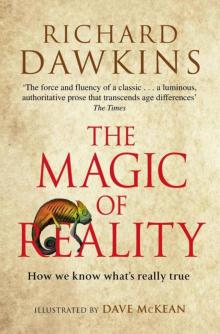 The Magic of Reality
The Magic of Reality The Extended Phenotype
The Extended Phenotype The God Delusion
The God Delusion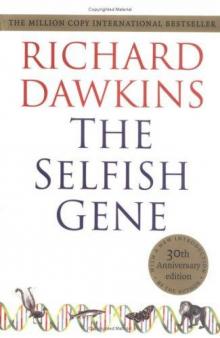 The Selfish Gene
The Selfish Gene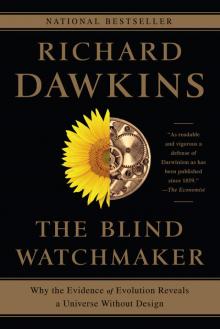 The Blind Watchmaker
The Blind Watchmaker The Greatest Show on Earth
The Greatest Show on Earth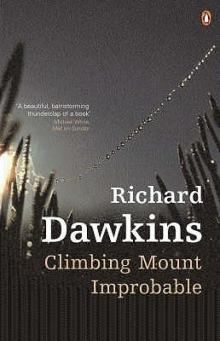 Climbing Mount Improbable
Climbing Mount Improbable Outgrowing God
Outgrowing God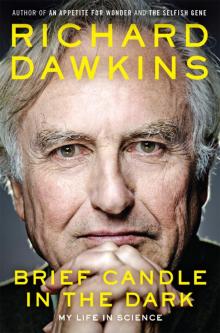 Brief Candle in the Dark
Brief Candle in the Dark The Greatest Show on Earth: The Evidence for Evolution
The Greatest Show on Earth: The Evidence for Evolution Science in the Soul
Science in the Soul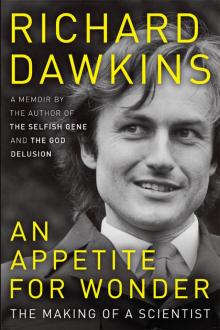 An Appetite for Wonder
An Appetite for Wonder